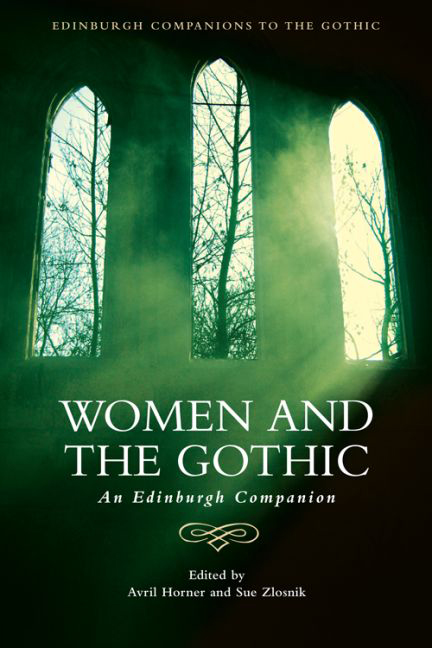Book contents
- Frontmatter
- Contents
- Acknowledgements
- Introduction
- Part I Family Matters
- Part II Trangressions
- Part III New Directions
- 11 Queering the Female Gothic
- 12 No Country for Old Women: Gender, Age and the Gothic
- 13 Virtual Gothic Women
- 14 Formations of Player Agency and Gender in Gothic Games
- Notes on Contributors
- Index
12 - No Country for Old Women: Gender, Age and the Gothic
from Part III - New Directions
Published online by Cambridge University Press: 23 September 2017
- Frontmatter
- Contents
- Acknowledgements
- Introduction
- Part I Family Matters
- Part II Trangressions
- Part III New Directions
- 11 Queering the Female Gothic
- 12 No Country for Old Women: Gender, Age and the Gothic
- 13 Virtual Gothic Women
- 14 Formations of Player Agency and Gender in Gothic Games
- Notes on Contributors
- Index
Summary
People ought to be one of two things: young or dead.
(Dorothy Parker, The Portable Dorothy Parker, p. 596)Old Age, at least in the West, has recently become a pressing issue for several reasons. The ‘demographic time bomb’ ticks away inexorably, prompting new interest in researching the implications of an ageing population. The emergence of age studies in cultural studies, pioneered by thinkers such as Margaret Morganroth Gullette and Kathleen Woodward in the USA, designated pots of money in the UK's Arts and Humanities Research Council for research into age-related issues, the UK coalition government's decision to dedicate an extra £6 million to research into Alzheimer's Disease (2014): all of these signal that ageing needs ‘dealing with’, whether from a cultural, medical or social perspective. Although there have been initiatives to think about older people more positively and to get them back to work – or, one might say more cynically, exploit them as an economic resource – the sense that the aged are a ‘problem’ is still widespread, particularly in highly sophisticated technological societies driven by the young. As Simone de Beauvoir pointed out over forty years ago: ‘Modern technocratic society thinks that knowledge does not accumulate with the years but grows out of date. Age brings disqualification with it: age is not an advantage’ (de Beauvoir 1985: 210). As with women's internalisation of masculine values, so the internalisation of societal perspectives on the old can lead to a sense of dislocation and, at its most extreme, existential crisis, in even the most talented individual. W. B. Yeats wrote of himself as ‘a tattered coat upon a stick’, for example, and Daphne du Maurier expressed horror at her appearance in photographs taken when she was 58 that made her look ‘like an old peasant woman of ninety’ ([1965] Malet 1993: 194). This ‘Othering’ of the self is due partly to the recognition of inevitable physical change and decay in one's own body and the sense of split subjectivity it can produce, and partly to the acceptance of social attitudes which see the old as irrelevant and an (increasingly heavy) economic burden.
It is clear that gender and age are both culturally inflected dimensions of subjectivity. Whereas medical science decrees 65 as the age at which senescence begins for both men and women, patriarchal societies tend to devalue women at a much younger age.
- Type
- Chapter
- Information
- Women and the GothicAn Edinburgh Companion, pp. 184 - 198Publisher: Edinburgh University PressPrint publication year: 2016



